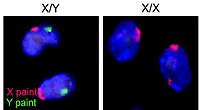| Part of a series on |
| Sex |
|---|
 |
| Biological terms |
| Sexual reproduction |
| Sexuality |
| Sexual system |
In biology and medicine, feminization is the development in an organism of physical characteristics that are usually unique to the females of the species. This may represent a normal developmental process, contributing to sexual differentiation. Feminization can also be induced by environmental factors, and this phenomenon has been observed in several animal species.[1][2] In the case of transgender hormone therapy, it is intentionally induced artificially.
Pathological feminization[edit]
In animals, when feminization occurs in a male, or at an inappropriate developmental age, it is often due to a genetic or acquired disorder of the endocrine system. In humans, one of the more common manifestations of abnormal feminization is gynecomastia, the inappropriate development of breasts which may result from elevated levels of feminizing hormones such as estrogens.[3] Deficiency or blockage of virilizing hormones (androgens) can also contribute to feminization. In some cases, high levels of androgens may produce both virilizing effects (increased body hair, deepened voice, increased muscle mass, etc.) and feminizing effects (gynecomastia) since androgens can be converted to estrogens by aromatase in the peripheral tissues.[3]
In insects, feminization can occur through inheritance of reproduction-manipulating endosymbionts. This promotes the inheritance of the endosymbionts because the endosymbionts are passed on by mothers to their eggs.[4] As such, the more endosymbiont-infected females there are in a population, the more the endosymbionts are passed on to the next generation.
See also[edit]
References[edit]
- ^ Fry, D.; Toone, C. (21 August 1981). "DDT-induced feminization of gull embryos". Science. 213 (4510): 922–924. Bibcode:1981Sci...213..922F. doi:10.1126/science.7256288. PMID 7256288.
- ^ Gimeno, Sylvia; Gerritsen, Anton; Bowmer, Tim; Komen, Hans (November 1996). "Feminization of male carp". Nature. 384 (6606): 221–222. Bibcode:1996Natur.384..221G. doi:10.1038/384221a0. PMID 8918871. S2CID 7497542.
- ^ a b Larsen, P. Reed; Williams, Robert L. (2003). Williams textbook of endocrinology. Philadelphia: W.B. Saunders. ISBN 0-7216-9184-6.[page needed]
- ^ Kageyama, D.; Nishimura, G.; Hoshizaki, S.; Ishikawa, Y. (June 2002). "Feminizing Wolbachia in an insect, Ostrinia furnacalis (Lepidoptera: Crambidae)". Heredity. 88 (6): 444–449. doi:10.1038/sj.hdy.6800077. PMID 12180086.